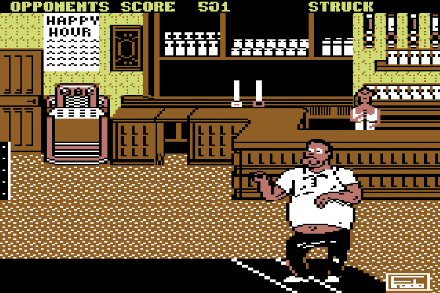If you consider today's multi-mega-million dollar industry, it's all about the lowest common denominator. Make a product that ticks all the boxes for the masses, and it's a go. It's much trickier to get backing if you have a brand-new, off-the-wall idea. That's probably why indie games are having such a resurgence.
| Attack of the Mutant Camels... on my iPhone. Pity the controls are rubbish (not Jeff Minter's fault!). |
This was great, and led to some incredibly imaginative, unique games. And in the grand spirit of Monty Python, some of the adversaries we had to contend with, or some of the protagonists we played as, were about as unlikely as you can get. I thought I'd look at a few.
 |
| Even if you've never watched Monty Python, this might look familiar... |
Both Manic Miner and Jet Set Willy are legendary names in the world of gaming. And although at their core they are simple platform games, each is blessed with the twisted heart of an evil genius. The games, that is... I'm not saying that Matthew Smith is evil, although I will level the charge of genius at him.
 |
| I need a wee, but I think I'd be better off holding it in... |
That darkness was expanded upon with the sequel, Jet Set Willy. Doing what all good sequels should, it increased the size and scope of the game massively, and threw far more off-the-wall enemies and situations your way. Forced by your maid to tidy up your mansion after an epic party if you want to sleep it off, you find there's far more to this abode than meets the eye.
 |
| What in the name of all things Holy is that thing? And why is it in my house? |
It's heady stuff, to be honest. The design, whether intentional or accidental, is such that you're compelled to keep playing after yet another irritating death. And, as with many games of this type, you want to keep exploring so you can see what's around the next corner. It's a template that was followed for quite a while, until platform games grew up a bit and started being either cartoony or a bit more realistic. For a couple of years, though, they were gloriously... manic.
 |
| Something tells me that alcohol wasn't the only thing ingested at this party... |
Possibly his finest example of beast/object cross-pollination, though, is Ancipital. Playing the role of Cippy, an anthropomorphic goat-like creature from an unnamed planet far away, wasn't enough, as far as Jeff Minter was concerned.
 |
| A 'No Smoking' sign on a cigarette break? Is that ironic, or not? |
Ancipital is an excellent game, and provides a ton of entertainment even today. I'm of the opinion that it would make a superb iOS game... let's hope that Jeff Minter has similar thoughts.
David and Richard Darling formed Codemasters, who are now renowned for producing some of the fastest and flashiest current-gen racing games. But they didn't start out like that. They started out as an 8-bit budget game label, selling games with the word Simulator in the title for £1.99 a pop. That was relatively successful for them, but things really took off when they published a series of games which put you in control of... an egg.
 |
| Like a whirlpool, it never ends... |
Who remembers Fat Worm Blows A Sparky? No, it wasn't Ron Jeremy's first gay porn film. It's actually an ingenious game where you controlled a worm that was stuck inside your ZX Spectrum. The object of the game was to collect fifty items called Spindles, then find a disk drive and clone yourself. Unfortunately, roaming around inside the Speccy were Creepers and Crawlers, and if these bugs managed to pounce on Fat Worm then eventually he would perish. His only defence was to fire Sparkies at the bugs.
 |
| Hope there aren't any seagulls inside this Spectrum... |
There were many others, of course. Monty on the Run featured a mole versus a whole host of marauding household objects. Fox Fights Back saw you playing as a gun-toting fox, defending himself against the likes of cycling beagles, mad squirrel bombers and egg-chucking chickens.
 |
| To progress, you must get past the flying clock and roaming teapot. Naturally. |
 |
| We all love a bit of Horace. There's something not quite right about this, though. |
 |
| The quick brown fox can't outrun the lazy dog on a bike. That's why he's carrying a shotgun. |
This was an important step in the evolution of video games... they would never be quite the same again. It's something I'm planning to talk about in the book to a degree, with comments from programmers and dedicated graphic artists hopefully providing some interesting insight. It'll certainly be interesting to me... I'm absolutely terrible at drawing!


































